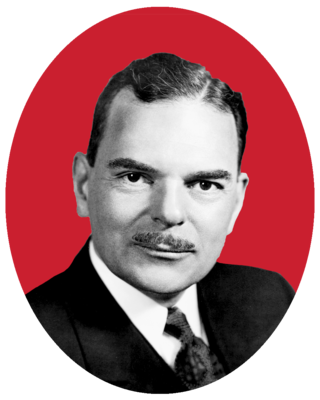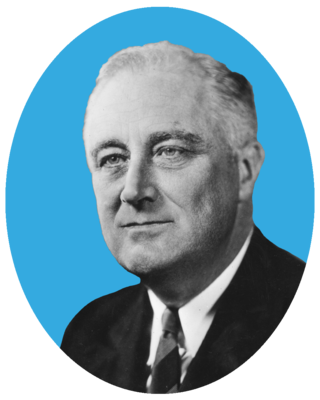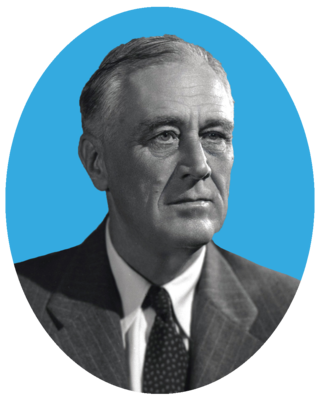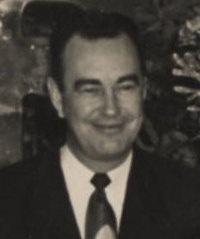
Adlai Ewing Stevenson was an American politician who served as the 23rd vice president of the United States from 1893 to 1897 under President Grover Cleveland. A member of the Democratic Party, he served as a U.S. Representative for Illinois in the late 1870s and early 1880s. He was the founder of the Stevenson political family.

Alben William Barkley was an American lawyer and politician from Kentucky who served as the 35th vice president of the United States from 1949 to 1953 under President Harry S. Truman. In 1905, he was elected to local offices and in 1912 as a U.S. representative. Serving in both houses of Congress, he was a liberal Democrat, supporting President Woodrow Wilson's New Freedom domestic agenda and foreign policy.
The 1948 Democratic National Convention was held at Philadelphia Convention Hall in Philadelphia, Pennsylvania, from July 12 to July 15, 1948, and resulted in the nominations of President Harry S. Truman for a full term and Senator Alben W. Barkley of Kentucky for vice president in the 1948 presidential election.
Southern Democrats are affiliates of the U.S. Democratic Party who reside in the Southern United States.

The 1948 Republican National Convention was held at the Municipal Auditorium, in Philadelphia, Pennsylvania, from June 21 to 25, 1948.

The 1952 Democratic National Convention was held at the International Amphitheatre in Chicago, Illinois from July 21 to July 26, 1952, which was the same arena the Republicans had gathered in a few weeks earlier for their national convention from July 7 to July 11, 1952. Four major candidates sought the presidential nomination: U.S. Senator Estes Kefauver of Tennessee, Governor Adlai Stevenson II of Illinois, Senator Richard Russell of Georgia and Averell Harriman of New York.

Wilson Watkins Wyatt was an American politician who served as Mayor of Louisville, Kentucky from 1941 to 1945 and as the 43rd Lieutenant Governor of Kentucky from 1959 to 1963. He was a member of the Democratic Party.

The 1940 Democratic National Convention was held at the Chicago Stadium in Chicago, Illinois from July 15 to July 18, 1940. The convention resulted in the nomination of President Franklin D. Roosevelt for an unprecedented third term. Secretary of Agriculture Henry A. Wallace from Iowa was nominated for vice president.

The 1944 Democratic National Convention was held at the Chicago Stadium in Chicago, Illinois from July 19 to July 21, 1944. The convention resulted in the nomination of President Franklin D. Roosevelt for an unprecedented fourth term. Senator Harry S. Truman of Missouri was nominated for vice president. Including Roosevelt's nomination for the vice-presidency in 1920, it was the fifth time Roosevelt had been nominated on a national ticket. The keynote address was given by Governor Robert S. Kerr of Oklahoma, in which he "gave tribute to Roosevelt's war leadership and new deal policies."
The 1928 Democratic National Convention was held at Sam Houston Hall in Houston, Texas, June 26–28, 1928. The keynote speaker was Claude G. Bowers. The convention resulted in the nomination of Governor Alfred E. Smith of New York for president and Senator Joseph T. Robinson of Arkansas for vice president.

The Kentucky Democratic Party is the affiliate of the Democratic Party in the U.S. state of Kentucky. It is currently the minority party in the state, as the rival Republican Party of Kentucky overwhelmingly dominates in the state legislature, congressional delegation, and presidential elections. However, the party does currently control the governorship and lieutenant governorship, and maintains some strength in local elections.

From March 11 to June 3, 1952, voters and members of the Democratic Party elected delegates to the 1952 Democratic National Convention, partly for the purpose of choosing a nominee for president in the 1952 United States presidential election. Incumbent President Harry S. Truman declined to campaign for re-election after losing the New Hampshire primary to Senator Estes Kefauver of Tennessee. Kefauver proceeded to win a majority of the popular vote, but failed to secure a majority of delegates, most of whom were selected through other means.

The 1948 United States presidential election in Vermont took place on November 2, 1948, as part of the 1948 United States presidential election which was held throughout all contemporary 48 states. Voters chose three representatives, or electors to the Electoral College, who voted for president and vice president.

The 1948 United States presidential election in New Jersey took place on November 2, 1948. All contemporary 48 states were part of the 1948 United States presidential election. Voters chose 16 electors to the Electoral College, which selected the president and vice president.

The 1948 United States presidential election in New Hampshire took place on November 2, 1948, as part of the 1948 United States presidential election, which was held throughout all contemporary 48 states. Voters chose four representatives, or electors to the Electoral College, who voted for president and vice president.

This article lists those who were potential candidates for the Democratic nomination for Vice President of the United States in the 1952 election. After winning the presidential nomination on the third ballot of the 1952 Democratic National Convention, Illinois Governor Adlai Stevenson consulted with Democratic Party leaders such as President Harry S. Truman and Speaker Sam Rayburn. Stevenson chose Alabama Senator John Sparkman, a Southern centrist, as his running mate. Sparkman won the vice presidential nomination on the first ballot as no serious rival tried to displace Stevenson's choice. However, many Northerners were not enthused with the choice of Sparkman due to Sparkman's stance on civil rights. During the 1952 convention, Sparkman, who had supported Senator Richard Russell for president, played a part in watering down the party's platform on civil rights. New York Representative Adam Clayton Powell Jr. and others walked out of the convention after the choice of Sparkman was announced. The Democratic ticket lost the 1952 election to the Republican ticket of Dwight D. Eisenhower and Richard Nixon.

This article lists those who were potential candidates for the Democratic nomination for Vice President of the United States in the 1948 election. At the 1948 Democratic National Convention, President Harry S. Truman won nomination for a full term. Truman had become president upon the death of his predecessor and 1944 running mate, Franklin D. Roosevelt. As the 25th Amendment had not yet been passed, there was no method for filling a vice presidential vacancy, and Truman served without a vice president during his first term. Truman's nomination faced significant opposition from the South, as did the party's platform on civil rights. Though Truman attempted to convince Supreme Court Justice William O. Douglas to join the ticket, Douglas declined. Truman instead selected Senate Minority Leader Alben W. Barkley, the preferred choice of many Democratic delegates, and a border state Senator who could appeal to both the Northern and Southern wings of the party. The Truman–Barkley ticket won the 1948 election, defeating the Republican (Dewey–Warren), Progressive (Wallace–Taylor), and Dixiecrat (Thurmond–Wright) tickets.

The 1956 United States Senate special election in Kentucky was held on November 6, 1956, to fill the vacant seat left by Alben Barkley. Former Senator John Sherman Cooper was elected to complete the term ending in 1961, defeating Democratic former Governor Lawrence Wetherby.

The 1948 United States presidential election in Tennessee took place on November 2, 1948, as part of the 1948 United States presidential election. Tennessee voters chose 12 representatives, or electors, to the Electoral College, who voted for president and vice president.















